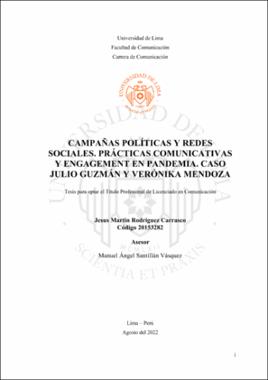Mostrar el registro sencillo del ítem
Campañas políticas y redes sociales. Prácticas comunicativas y engagement en pandemia. Caso Julio Guzmán y Verónika Mendoza
| dc.contributor.advisor | Santillán Vásquez, Manuel Ángel | |
| dc.contributor.author | Rodriguez Carrasco, Jesus Martin | |
| dc.date.accessioned | 2022-12-06T22:14:39Z | |
| dc.date.available | 2022-12-06T22:14:39Z | |
| dc.date.issued | 2022 | |
| dc.identifier.citation | Rodriguez Carrasco, J. M. (2022). Campañas políticas y redes sociales. Prácticas comunicativas y engagement en pandemia. Caso Julio Guzmán y Verónika Mendoza [Tesis para optar el Título Profesional de Licenciado en Comunicación, Universidad de Lima]. Repositorio Institucional de la Universidad de Lima. https://hdl.handle.net/20.500.12724/17168 | es_PE |
| dc.identifier.uri | https://hdl.handle.net/20.500.12724/17168 | |
| dc.description.abstract | Esta investigación tiene como objetivo principal analizar las prácticas comunicativas de los candidatos presidenciales Julio Guzmán y Verónika Mendoza en sus redes sociales durante la época de la pandemia de la COVID-19, desde el inicio del Estado de emergencia por la aparición de esta (15 de marzo de 2020) hasta seis meses después (15 de septiembre del 2020), así como el grado de engagement que obtuvieron, a partir de la interacción con sus respectivas audiencias; en particular, se hace énfasis en la comunicación que ambos generaron —en sus publicaciones— en torno al desarrollo de transmisiones de video en vivo en redes sociales, a las que denominamos eventos SMLS (Social Media Live Streaming). Cuantitativamente se usó el análisis de contenido, mientras que cualitativamente, la netnografía. Para esos fines, trabajamos una muestra de 20 publicaciones de J.G y 41 de V.M en sus respectivas cuentas de Facebook, Instagram y Twitter, del año 2020. Los resultados indican que ambos no tuvieron reales intenciones de generar un diálogo bidireccional con sus seguidores, que mientras Guzmán buscó posicionarse en torno a su partido político y sus miembros, Mendoza buscó hacerlo con base en su interés y cercanía con determinadas problemáticas y comunidades vulnerables. | es_PE |
| dc.description.abstract | This research analyzes the communication practices of Perú presidential candidates Julio Guzmán and Verónika Mendoza in their social networks, during the COVID-19 pandemic, from the beginning of the State of Emergency, due to the appearance of COVID-19 in Perú (March 15th, 2020), to six months later (September 15th, 2020). We want to account for the degree of engagement they obtained since interacting with their respective audiences. We emphasized the communication that they both generated —in their posts— around the development of live video broadcasts on social networks, which we call SMLS (Social Media Live Streaming) events. Content analysis has been used for the quantitative method and nethnography was used in a qualitative way. For these purposes, we worked on a sample of 20 posts by J. G and 41 by V.M in their respective Facebook, Instagram, and Twitter account for the year 2020. The results indicate that they both had no real intentions of generating a two-way dialogue with their followers. Moreover, while Guzmán sought to position himself around the group of his political party and its members, Mendoza sought to do so based on his interest and closeness to specific problems and vulnerable communities. | en_EN |
| dc.format | application/pdf | |
| dc.language.iso | spa | |
| dc.publisher | Universidad de Lima | |
| dc.rights | info:eu-repo/semantics/openAccess | * |
| dc.rights.uri | https://creativecommons.org/licenses/by-nc-sa/4.0/ | * |
| dc.source | Repositorio Institucional - Ulima | es_PE |
| dc.source | Universidad de Lima | es_PE |
| dc.subject | Political campaigns | en_EN |
| dc.subject | Political communication | en_EN |
| dc.subject | Presidential candidates | en_EN |
| dc.subject | Pandemics | en_EN |
| dc.subject | COVID-19 | en_EN |
| dc.subject | Campañas electorales | es_PE |
| dc.subject | Comunicación política | es_PE |
| dc.subject | Candidatos presidenciales | es_PE |
| dc.subject | Pandemias | es_PE |
| dc.title | Campañas políticas y redes sociales. Prácticas comunicativas y engagement en pandemia. Caso Julio Guzmán y Verónika Mendoza | es_PE |
| dc.type | info:eu-repo/semantics/bachelorThesis | |
| thesis.degree.level | Título Profesional | es_PE |
| thesis.degree.discipline | Comunicación | es_PE |
| thesis.degree.grantor | Universidad de Lima. Facultad de Comunicación. | es_PE |
| dc.publisher.country | PE | |
| dc.type.other | Tesis | |
| thesis.degree.name | Licenciado en Comunicación | es_PE |
| renati.advisor.orcid | https://orcid.org/0000-0003-0290-7514 | |
| renati.discipline | 322026 | |
| renati.author.dni | 70503389 | |
| renati.level | https://purl.org/pe-repo/renati/level#tituloProfesional | * |
| renati.advisor.dni | 6508551 | |
| renati.juror | Mackelmann Roedenbeck, Mathias | |
| renati.juror | Santillán Vásquez, Manuel | |
| renati.juror | Mendoza Michilot, María | |
| renati.type | https://purl.org/pe-repo/renati/type#tesis | * |
| dc.subject.ocde | https://purl.org/pe-repo/ocde/ford#5.08.00 | |
| ulima.cat | OI |
Ficheros en el ítem
Este ítem aparece en la(s) siguiente(s) colección(ones)
-
Tesis [191]





